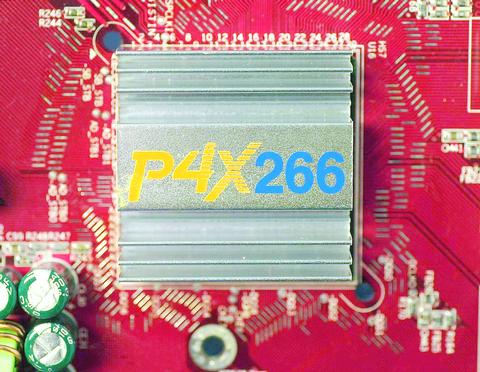VIA Technologies Inc (
VIA announced the release of the P4x266 chipset, which is designed for use with Intel Pentium4 chips. Chipsets act as a central nervous system in a computer, controlling the flow of data between the CPU, memory and other components. VIA introduced the product without the customary licensing agreement from Intel.
To that end, the two companies appear set to relive a battle fought last year over the right of VIA to make a chipset compatible with an Intel CPU without a license from Intel.

PHOTO: CHIANG YING-YING, TAIPEI TIMES
"We believe that we are not infringing on any Intel patents ... The license issue is a business consideration, not a legal one," said Ted Lee (
In order to create chipsets for use with Intel CPUs, companies generally negotiate a licensing agreement with the US-based multinational first.
Last year, VIA made chipsets designed for Intel's Pentium III CPU. VIA wagered the market would be receptive to a product that would be less expensive than Rambus-based memory chips. It shipped its new chipsets without a license and Intel sued.
"There were some legal actions and they have been concluded," Richard Brown, director of marketing at VIA said. "We were found not to have made any infringements on the [Intel] patents."
Via was forced to pay the licensing fee, however.
The gamble won big returns for VIA. The market snapped up VIA-made chipsets -- to the detriment of Intel's chipset business -- enabling the Taiwanese firm to capture a third of the global chipset market. VIA's revenues grew 171 percent to NT$31 billion (US$936 million) last year, and this year, the firm is looking for another memory-based win.
Pentium4 chips are currently only found with Rambus memory, but VIA -- and the worldwide memory chip industry -- have a less expensive alternative, called DDR memory. Analysts say that because of its contract with Rambus Inc, Intel is not allowed to produce chipsets compatible with DDR memory until 2002, which gives VIA a five-month head start.
To slow VIA down, Intel has refused to issue a license for the new chipset, said one analyst who requested anonymity. The company has gone so far as to warn motherboard makers in Taiwan against using VIA's P4x266 chipsets.
In response, Taiwan's top motherboard makers, Asustek Computer Inc (華碩電腦), Gigabyte Technology Co (技嘉科技), Micro-Star International Co Ltd (微星科技) and Elitegroup Computer Systems Ltd (精英電腦), have all acquiesced to Intel, and plan to wait until Via acquires a license before putting VIA chipsets on their motherboards. VIA, however, says business is humming.
"We are starting to ship to various motherboard manufacturers in Taiwan," Brown said.
He also pledged that VIA would "indemnify [motherboard and other component makers] against any kind of suit that would be incurred should Intel decide to go along that route."

BYPASSING CHINA TARIFFS: In the first five months of this year, Foxconn sent US$4.4bn of iPhones to the US from India, compared with US$3.7bn in the whole of last year Nearly all the iPhones exported by Foxconn Technology Group (富士康科技集團) from India went to the US between March and last month, customs data showed, far above last year’s average of 50 percent and a clear sign of Apple Inc’s efforts to bypass high US tariffs imposed on China. The numbers, being reported by Reuters for the first time, show that Apple has realigned its India exports to almost exclusively serve the US market, when previously the devices were more widely distributed to nations including the Netherlands and the Czech Republic. During March to last month, Foxconn, known as Hon Hai Precision Industry

Taiwan Semiconductor Manufacturing Co (TSMC, 台積電) and the University of Tokyo (UTokyo) yesterday announced the launch of the TSMC-UTokyo Lab to promote advanced semiconductor research, education and talent development. The lab is TSMC’s first laboratory collaboration with a university outside Taiwan, the company said in a statement. The lab would leverage “the extensive knowledge, experience, and creativity” of both institutions, the company said. It is located in the Asano Section of UTokyo’s Hongo, Tokyo, campus and would be managed by UTokyo faculty, guided by directors from UTokyo and TSMC, the company said. TSMC began working with UTokyo in 2019, resulting in 21 research projects,

Ashton Hall’s morning routine involves dunking his head in iced Saratoga Spring Water. For the company that sells the bottled water — Hall’s brand of choice for drinking, brushing his teeth and submerging himself — that is fantastic news. “We’re so thankful to this incredible fitness influencer called Ashton Hall,” Saratoga owner Primo Brands Corp’s CEO Robbert Rietbroek said on an earnings call after Hall’s morning routine video went viral. “He really helped put our brand on the map.” Primo Brands, which was not affiliated with Hall when he made his video, is among the increasing number of companies benefiting from influencer

Quanta Computer Inc (廣達) chairman Barry Lam (林百里) yesterday expressed a downbeat view about the prospects of humanoid robots, given high manufacturing costs and a lack of target customers. Despite rising demand and high expectations for humanoid robots, high research-and-development costs and uncertain profitability remain major concerns, Lam told reporters following the company’s annual shareholders’ meeting in Taoyuan. “Since it seems a bit unworthy to use such high-cost robots to do household chores, I believe robots designed for specific purposes would be more valuable and present a better business opportunity,” Lam said Instead of investing in humanoid robots, Quanta has opted to invest